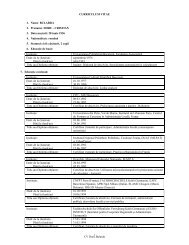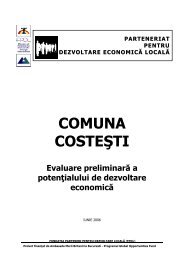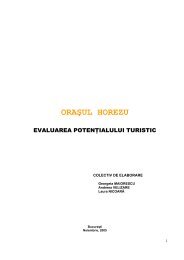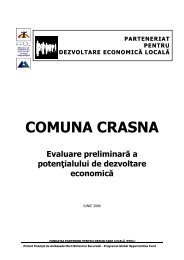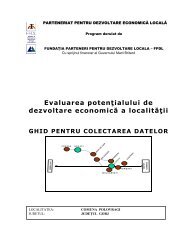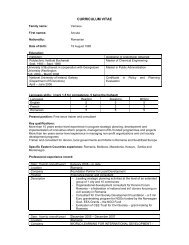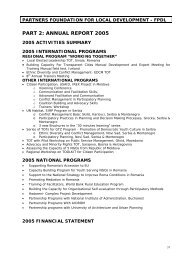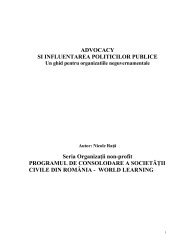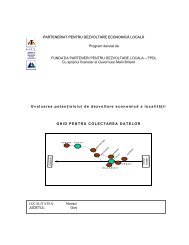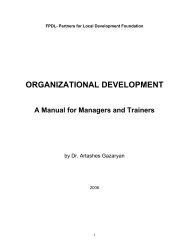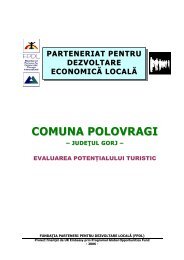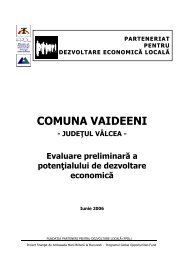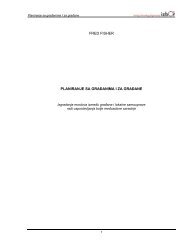ANNUAL REPORT 2009 - FPDL
ANNUAL REPORT 2009 - FPDL
ANNUAL REPORT 2009 - FPDL
Create successful ePaper yourself
Turn your PDF publications into a flip-book with our unique Google optimized e-Paper software.
developmental impact beyond the geographic limits of the present programme. Thisis true of the materials already developed, and is likely to be significant also with theprogram being currently developed on fighting corruption, where the partners involvedinclude UN-HABITAT, World Bank Institute Transparency International and PartnersInternational.Spread effect: impacts beyond the project. An especially significant aspect of theproject is the degree to which there are positive results beyond the direct objectives.This relates directly to the relations with partner organizations. The training materialshave been developed together with UN-HABITAT, and have the UN logo. Testing ofmaterials has been done jointly and training of trainers has also been implementedinternationally e.g. in India. Materials such as the local leadership are regularly usedin many countries, normally translated in local languages. This broad benefit providesa significant developmental bonus outside of the project and at the same time allowsthe utilization of greater resources, intellectual, human and financial. The linking ofexperience within the region and outside the region provides fresh insights and astimulus for the staff involved in the programmes.Participating in the TOT and training programs offered by <strong>FPDL</strong> had a clear positiveinfluence on the beneficiaries. 76% of the respondents reported a considerable andtangible improvement of their knowledge and skills and also an advance in theirpersonal and professional development. On average, the positive influence of the TOTand training programs on the beneficiaries was rated 4.72 out of a maximum score of5. Besides mentioning the increased applicability of knowledge and its dissemination,some respondents stated that having attended the TOT and training programsdelivered by <strong>FPDL</strong> allowed them to apply the newly gained knowledge and skills totheir daily life, others explicitly mentioned the importance of being exposed to thelatest state-of-the-art knowledge to increase their capacity to train. According to onerespondent, “the skills/knowledge acquired was extremely helpful both for mypersonal development in terms of improved self-confidence and communication skills.Furthermore, I was among the privileged ones to meet in person Mr. Fred Fischer andassist him during a training session for ALDA members organised in 2005. That wasone of the most rewarding experiences for my work as a trainer.” The range ofpositive influences is well encapsulated in the following statement by anotherrespondent: “The greatest impact of <strong>FPDL</strong> trainings lies in networking and exchange ofexperience. As a result of the trainings, I have developed strong and long-lastingrelationships with several organizations and individuals in the region. Wecommunicate on daily basis, exchange training materials and develop joint projects. Igained substantial knowledge of ethnic diversity management and organizationaldevelopment which I use in the preparation of workshops and capacity buildingactivities. I make extensive use of the training manuals in preparing a tailoredapproach for my country. I significantly improved my knowledge of anticorruption andhave adopted an entirely new perspective in addressing this issue at the local level.”<strong>FPDL</strong> as an institution<strong>FPDL</strong> is a small, but very effective institution with a high reputation regionally andinternationally. It is one of the few institutions in the region with broad internationalexperience as well as strong local roots, and is thus a valuable resource, which shouldbe nurtured. Challenges focus on how to keep the essential values and motivationswhile facing the probable need to grow and to build the foundations of sustainabilityas an institution. The organization is financially sound and well managed, though itlacks some of the formal systems which are increasingly being demanded, especiallywithin the region – accreditation of its courses and quality certification. An excellentself-evaluation was completed, which is attached as Appendix 4 of this report.19



